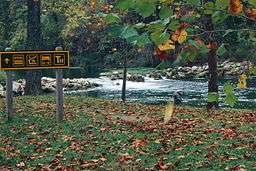Bennett Spring State Park
| Bennett Spring State Park | |
| Missouri State Park | |
 | |
| Country | United States |
|---|---|
| State | Missouri |
| Counties | Dallas, Laclede |
| Elevation | 1,076 ft (328 m) [1] |
| Coordinates | 37°43′32″N 92°51′45″W / 37.72556°N 92.86250°WCoordinates: 37°43′32″N 92°51′45″W / 37.72556°N 92.86250°W [1] |
| Area | 3,216.74 acres (1,302 ha) [2] |
| Established | 1923 |
| Management | Missouri Department of Natural Resources |
|
Location in Missouri
| |
| Website: Bennett Spring State Park | |
|
Bennett Spring State Park Shelter House and Water Gauge Station | |
| Location | Dallas / Laclede counties, Missouri, USA, near Bennett Springs, Missouri |
| Built | 1933 |
| Architect | CCC; NPS |
| MPS | ECW Architecture in Missouri State Parks 1933-1942 TR |
| NRHP Reference # | 85000527[3] |
| Added to NRHP | February 28, 1985 |
Bennett Spring State Park is located in Bennett Springs, Missouri, approximately 12 miles (19 km) west of Lebanon on Highway 64 and is in Dallas and Laclede counties. The park was established in 1923. It is centered on the spring that flows into the Niangua River and gives the park its name. The spring averages 100 million gallons (380,000 m3) of daily flow.[4] The park offers fly fishing, camping, canoeing, and hiking, among other activities.
History
In 1837 the James Brice family built a mill at the stream and the spring became known as Brice Spring. The town that built up was known as Brice. The family of Peter Bennett soon settled near the spring and started their own mill. Originally, the families were rivals, but they soon intermarried. Both of these mills were eventually destroyed in a flood. During the Civil War years, another mill was constructed by Peter Bennett. This Bennett Mill was larger and more successful than the Brice mill. The spring soon took on the Bennett name. Peter died in 1882 and his son William Sherman Bennett took over. The Bennett Mill burned in 1895.
In the 1930s the Civilian Conservation Corps (CCC) made various improvements to the park. The CCC built the dining lodge, cabins, trails, roads, shelters, gauge station, and the arched stone bridge across the spring branch. The bridge has 3 distinctive sideways “C’s” to memorialize the men of the CCC who built it. The CCC also channelized the spring branch and constructed the dam just upstream of the stone bridge to make the spring more habitable to the non-native trout. The dam is used to divert water through the fish hatchery and to maintain a constant water level at Bennett Spring to this day.
Activities and amenities
- Trout fishing
The park offers trout fishing for both rainbow trout and brown trout in the natural spring that is the namesake of the park. The fishing area is divided into three zones, each with its own set of regulations.[5] During the regular season, fish may be caught and kept. Catch and release regulations are in effect during the winter months. Daily fishing begins and ends with a whistle or siren. The opening march of the angler can sometimes resemble a Civil War–style battle line as the anglers progress into the water with rod in hand.
- Trails
There are 12 miles (19 km) of hiking trails named Natural Tunnel, Savanna Ridge, Spring, Whistle, Oak Hickory, Bluff, and Bridge.
- Other
The park also offers canoeing on the Niangua River, campsites, cabins, a swimming pool, nature center, dining lodge, and park store.[6]
References
- 1 2 "Bennett Spring State Park". Geographic Names Information System. United States Geological Survey.
- ↑ "State parks...estimated acres" (PDF). Revised Statewide Comprehensive Outdoor Recreation Plan: 2008-2012. Missouri Department of Natural Resources. pp. 142–143. Retrieved September 9, 2014.
- ↑ National Park Service (2007-01-23). "National Register Information System". National Register of Historic Places. National Park Service.
- ↑ "Current Conditions for USGS 06923500 Bennett Spring at Bennett Springs, MO". U.S. Geological Survey. Retrieved 2012-06-17.
- ↑ "Fishing at Bennett Spring State Park". Missouri State Parks. Missouri Department of Natural Resources. Retrieved October 1, 2014.
- ↑ "Bennett Spring State Park". Missouri State Parks. Missouri Department of Natural Resources. Retrieved October 1, 2014.
External links
- Bennett Spring State Park Missouri Department of Natural Resources